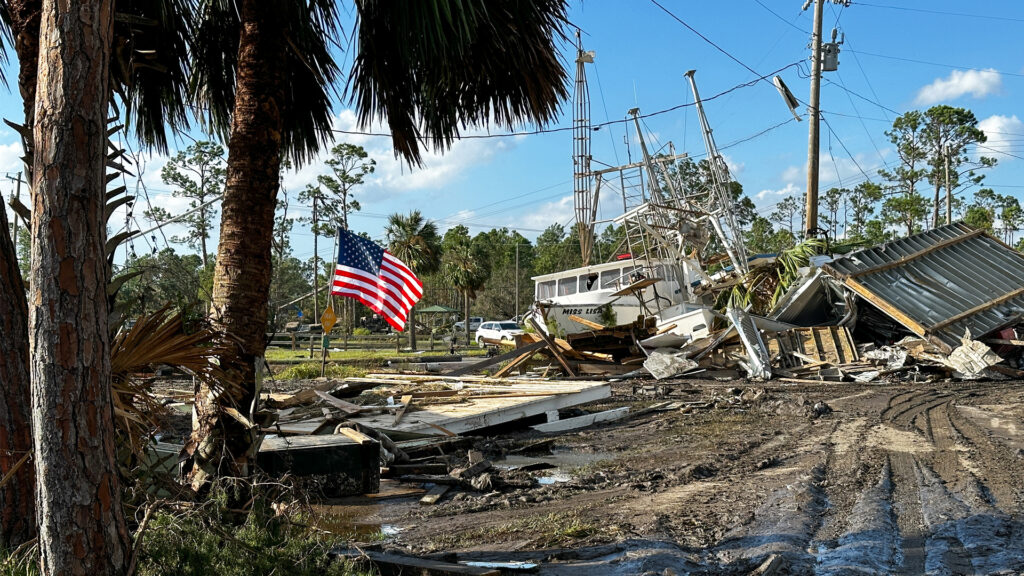By the Palm Beach Post Editorial Board
Another hurricane, another day after, and still more than a month before the 2024 storm season comes to a close. Hurricanes Debby, Helene and most recently Milton have left the state reeling from loss of life and property damage. Recovery remains the emphasis as Florida needs all the help it can get in the long process of rebuilding.
Fortunately, Florida is getting aid. President Joe Biden issued a post-landfall federal declaration for disaster relief, which makes federal funding available to individuals and communities in Palm Beach County and 33 other counties and the Miccosukee Tribe of Florida. The president also came to Florida to personally view Milton’s devastation, marking his second hurricane-related visit to the Sunshine State in two weeks, having also come after Hurricane Helene.
It’s unfortunate that Florida Gov Ron DeSantis chose not to be with the president during either of Biden’s three visits. Scheduling conflicts, DeSantis claims. More like bad optics, partisan politics and extremely poor manners.
Natural disasters are one of those times when a storm-wracked state like Florida expects to see its elected leaders come together in a show of resolve to address a crisis that will take time to fix. Gamesmanship shouldn’t be a priority, particularly when the one-two punch of Helene and Milton could further disrupt Florida’s fragile property insurance market.

State leaders and insurance industry officials believe the two storms are “manageable,” but as claims continue to trickle in — $586 million in losses from nearly 44,000 claims from Milton, according to early estimates — there is cause for concern even if the true impact of the two storms won’t be felt in higher homeowners’ insurance rates until next year.
Beyond recovery, the focus should be on change, a different way local and state leaders approach storm preparation, resiliency and the redevelopment of coastal and low-lying areas that are consistently vulnerable to flooding.
“We’re going to have to start looking at … a whole new, this is my feeling, a whole new philosophy of reconstruction and resilience and resiliency in our state,” said outgoing Florida Senate President Kathleen Passidomo last week. “A lot of these little homes, they’re going to be destroyed. Some of them already have been, in Helene. And how are we going to rebuild? It’s going to be a challenge. I think that’s going to dominate our next session.”
It should. That is the challenge for Gov. DeSantis, the Florida Cabinet and state lawmakers — coming up with “a whole new philosophy.” It shouldn’t take two major storms to show state leaders that the status quo needs serious tweaking.
Is it, for example, time to rethink and craft state laws that would limit development so close to Florida’s coasts and in areas that have consistently been prone to flooding? Perhaps the state could rely more on experts outside of the insurance industry to craft credible climate change remedies. Maybe it’s time to fully fund state regulatory efforts to ensure insurers actually have the financial means to pay claims and actually do so if a natural disaster strikes.
If the state doesn’t act, the marketplace that conservatives and Republicans so often revere will. An already skittish insurance industry is still assessing the damage of Milton, a powerful Category 4 hurricane that plowed into the state near Tampa and stormed across the state’s populous mid-section, leaving a wave of tornadoes as far south as Wellington and Palm Beach Gardens. Florida, to hear state leaders tell it, has made progress in bringing in new insurers to provide coverage. But, that little progress could be easily erased depending upon the costs of claims resulting from hurricanes Helene and Milton.
Passidomo speaks from experience. She and her southwest Florida district felt the brunt of Hurricane Ian in 2022, and as senate president she and her chamber grappled with Hurricane Idalia in 2023 and this year alone, Debby, Helene and now Milton. Unfortunately, Passidomo won’t be part of the legislative leadership next session.
The task to step up and seriously address storm response, climate change and property insurance will fall on incoming House Speaker Daniel Perez, R-Miami and Senate President Ben Albritton, R-Bartow. They, along with the governor, had better heed Passidomo’s concerns. Florida’s future depends on it.
This opinion piece was originally published by the Palm Beach Post, which is a media partner of The Invading Sea. Banner photo: Damage caused by Hurricane Helene in Steinhatchee (U.S. Army Photo by Brigida Sanchez, via via Defense Visual Information Distribution Service).
If you are interested in submitting an opinion piece to The Invading Sea, email Editor Nathan Crabbe at ncrabbe@fau.edu. Sign up for The Invading Sea newsletter by visiting here.



